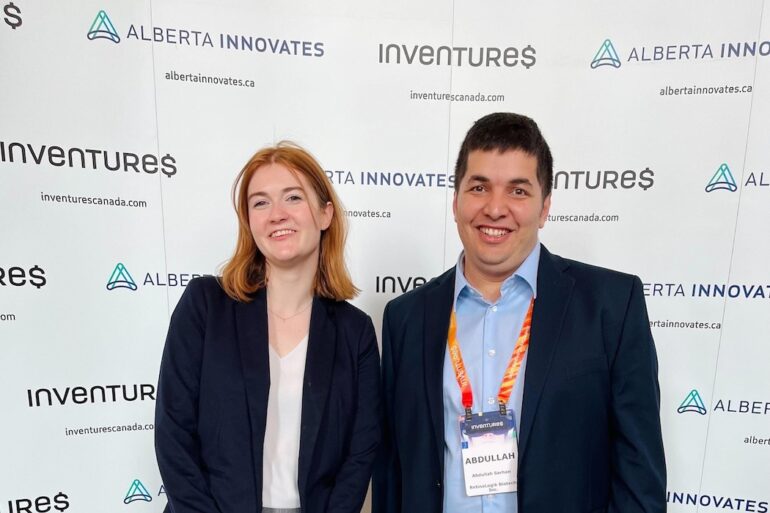Calgary-based startup RetinaLogik has closed $783,000 CAD in an oversubscribed round of pre-seed funding as it looks to scale its portable eye test device that combines artificial intelligence (AI) with virtual reality (VR).
The pre-seed round, which consists of SAFEs, was led by HaloHealth, with participation from Spring Impact Capital, an angel investment syndicate created by StartupTNT, UCeed’s Haskayne Student Fund, York Angels, and other independent angel investors.
“I feel like we often expect medical care to be uncomfortable, and it is necessary sometimes, don’t get me wrong. But in this case, it’s not necessary.”
RetinaLogik was co-founded by CEO Abdullah Sarhan and COO Julia St.Amand. While completing his PhD specializing in deep learning applied to vision science, Sarhan began exploring how he could increase the impact of his research by attending various hackathons.
It was at one of those hackathons where he met St.Amand, a kinesiology and business graduate from the University of Calgary.
“We really hit it off and had a lot of fun working together in this hectic hackathon environment to solve healthcare challenges, and we realized we had a lot of shared values and worked really well together,” St.Amand said.
In 2018, the duo started working on what would eventually become RetinaLogik. The startup went through several years of product development and testing to create a portable eye test using virtual reality glasses.
Globally, at least 1.1 billion people globally live with vision loss, with many lacking access to sufficient vision care—something Sarhan noticed during a research trip to Uganda.
Currently, optometrists and ophthalmologists use large, cumbersome machines that St.Amand likened to a “fax machine in the ‘80s.” She noted these testing machines aren’t portable, often take up an entire room, and require specialized technicians and often up to an hour of testing and retesting to ensure the results are accurate.
“When [Sarhan] mentioned this test, I instantly knew what test it was because my dad actually has glaucoma and he has to get this test done four times a year to make sure that it’s not progressing,” St.Amand added. “He always complains about it.”
The pair created their portable eye test prototype in 2019, but continued to iterate on the device and test it with clinics.
Today, RetinaLogik’s platform allows vision care providers to collect and analyze visual field data with a virtual reality headset and advanced analytics software. While wearing the headset, patients are guided through a tutorial in their own language, and then perform various vision tests that can then be viewed remotely by a vision specialist, even if they are not in the same physical location.
Today, RetinaLogik’s device is deployed in clinics across Canada. The startup has also sought to increase access to vision care for seniors by partnering with optometrists and ophthalmologists who can use the device to perform eye tests at senior homes.
With the new funding, RetinaLogik plans to scale its team, add new vision tests to its product, support sales of the device, and obtain its Class 2 certification from Health Canada.
During its history, RetinaLogik has received both dilutive and non-dilutive funding, outside of this latest funding round. To date, RetinaLogik has raised $1.7 million, which, excluding its pre-seed fundraise, includes $600,000 in non-dilutive funding and $150,000 in dilutive investment.
RELATED: University of Calgary’s “venture philanthropy fund” UCeed targets pre-seed funding gap
By offering a cheaper, faster, and portable device that can perform tests with results “comparable to the gold standard,” according to the startup’s website, RetinaLogik is also looking to solve some long-standing challenges faced by vision care specialists.
“Optometrists want to compete on patient care experience, but they have the challenge of footprint. They don’t have much space in the clinic,” Sarhan said, adding that many clinics also struggle to hire skilled technicians, which can lead to backlogs and bottlenecks within clinics.
By deploying their device across a broader range of clinics, the co-founders of RetinaLogik aim to bridge the gap in access to vision care. According to the International Agency for the Prevention of Blindness, 90 percent of vision loss can be prevented or treated with the right care, yet up to three billion people globally need ongoing services to optimize their vision.
St. Amand said RetinaLogik’s device has the potential to not only expand access to these services but also to enhance the patient experience significantly.
“I feel like we often expect medical care to be uncomfortable, and it is necessary sometimes, don’t get me wrong,” she said. “But in this case, it’s not necessary.”
Feature image courtesy RetinaLogik.


